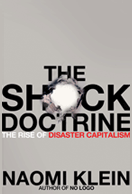The Shock Doctrine

Federal Reserve Refuses to Disclose Details of Loans Totalling $2 Trillion
Mark Pittman, Bob Ivry and Alison Fitzgerald, Bloomberg News, November 10, 2008
"The Federal Reserve is refusing to identify the recipients of almost $2 trillion of emergency loans from American taxpayers or the troubled assets the central bank is accepting as collateral.
"Fed Chairman Ben S. Bernanke and Treasury Secretary Henry Paulson said in September they would comply with congressional demands for transparency in a $700 billion bailout of the banking system. Two months later, as the Fed lends far more than that in separate rescue programs that didn't require approval by Congress, Americans have no idea where their money is going or what securities the banks are pledging in return....
"Bloomberg News has requested details of the Fed lending under the U.S. Freedom of Information Act and filed a federal lawsuit Nov. 7 seeking to force disclosure."
See Also:
Lawmakers, Investors Ask Fed for Lending Disclosure, Bloomberg News, November 13
What Crisis? Banking Lending is on the Rise, Say Experts
Mike Meyers, Minneapolis Star-Tribune, November 2, 2008
"The nation indeed may be facing a financial crisis, with large institutions failing in the wake of multibillion debts, but most bank-lending to business customers actually has been on the rise....
"'The story goes that they [banks] are holding on to the money or putting it into Treasury bills,' said Lawrence Christiano, a Northwestern University economist and consultant to the Federal Reserve Bank of Minneapolis. 'That seems to fly directly into the face of the evidence that's out there.'
"It's a puzzle that's getting little attention, even as hundreds of billions of taxpayer dollars are devoted to fixing a problem that seems belied by government figures. 'Their own data seems to contradict their position,' said V.V. Chari. 'It would be valuable for them to explain what they're talking about.'
"The $700 billion taxpayer bailout of large players in the financial system reminds Chari of the buildup to the Iraq war. 'The analogies with the war in Iraq are more than disturbing,' Chari said. 'We're again hearing things like: "We know things you don't know. Trust us."
Goldman Sachs, Merrill Lynch Take Bailout Money, Slash Jobs
Stephen Gandel, Stephen Gandel, October 27, 2008
"Uncle Sam has a new name on Wall Street — Sugar Daddy. Bonuses for investment bankers and traders are projected to fall 40% this year. But analysts, compensation consultants and recruiters say the drop would be much more severe, perhaps as much as 70%, were it not for the government's efforts to prop up financial firms....
"One factor mitigating the financial industry's bonus intentions is the fact that there could be far fewer employed Wall Streeters by the time year-end payouts are made. Goldman Sachs reportedly plans to cut 10%, or 3,250 workers, from its payrolls. Barclays is expected to eliminate 3,000 jobs from the former investment-banking division of Lehman Brothers, which it acquired in September. And Merrill Lynch's John Thain recently said that he expects thousands of job cuts in the wake of his firm's acquisition. All told, Hintz expects Wall Street employment to fall 25%, which could mean a loss of 43,250 jobs in New York City alone and more than 200,000 jobs nationwide by the end of 2009."
Lobbyists Urge Bailout Money for Insurers, Automakers
Edmund L. Andrews and Eric Dash, New York Times, October 25, 2008
"The chase for a piece of the Treasury Department’s $700 billion bailout program intensified Friday as the government considered extending it to include insurance companies as well as banks, and the auto industry stepped up efforts to secure a share of the money....
"The Financial Services Roundtable, a lobbying group for financial services companies, asked the Treasury Department on Friday to open its program to broker-dealers, insurance companies, car companies and financial institutions owned by foreign corporations....
"Although the insurance industry is under pressure because of investment losses, some analysts said they did not understand why insurers needed immediate government help....Virtually all insurers have suffered investment losses, which in turn have driven down their stock prices, sometimes sharply, as investors dumped shares to avoid dilution while companies raise new money. And the credit rating agencies have been reviewing and downgrading many insurers’ debt this month.
"But neither of those trends implies an urgent liquidity crisis that would leave insurers unable to pay claims, analysts said. Insurers are generally considered immune to run-on-the-bank panics because they do not take deposits. Policyholders cannot usually pull out their money without incurring losses."
See also:
Hedge Funds Make Plea for Bailout Cash
"Insurance companies, automakers, hedge funds and foreign-owned banks are all making appeals to be included in the rescue package, contending that they need assistance as well."
Treasury Official Says Banking Consolidations Are a Goal of the Bailout
Mark Landler, New York Times, October 21, 2008
"In a step that could accelerate a shakeout of the nation's banks, the Treasury Department hopes to spur a new round of mergers by steering some of the money in its $250 billion rescue package to banks that are willing to buy weaker rivals, according to government officials.
"As the Treasury embarks on its unprecedented recapitalization, it is becoming clear that the government wants not only to stabilize the industry, but also to reshape it. Two senior officials said the selection criteria would include banks that need more capital to finance acquisitions.
"'Treasury doesn't want to prop up weak banks,' said an official who spoke on condition of anonymity, because of the sensitivity of the matter. 'One purpose of this plan is to drive consolidation.'"
Treasury to Outsource Implementation of $700 Billion Bailout
Mark Landler and Edmund L. Andrews, New York Times, October 4, 2008
"Treasury officials do not plan to manage the mortgage assets on their own. Instead, they will outsource nearly all of the work to professionals, who will oversee huge portfolios of bonds and other securities for a management fee....
"The selected asset management firms will receive a chunk of the $250 billion that Congress is allowing the Treasury to spend in the first phase of the bailout. Those firms will receive fees that are likely to be lower than the industry standard of 1 percent of assets, or $1 for every $100 under management....
"Using outside contractors on such an extensive scale raises a host of thorny questions, outside experts said. Among the most pressing is: How will the Treasury avoid conflicts of interest that fund managers will encounter as they work both for their own clients’ interests — which could pay higher fees — and the interests of taxpayers?
"'With anyone short of the stature and honesty of a Paul Volcker running it, you need to worry a lot about conflicts of interest,' said Alan S. Blinder, a former vice chairman of the Federal Reserve, referring to its former head. 'Unfortunately, there just aren’t many people with the expertise you need but without any possible conflicts.'"
See Also:
Treasury to dole out no-bid contracts due to "compelling urgency" of the crisis
Lobbyists Target 80 House Members on Bailout Vote
Jeanne Cummings and Victoria McGrane, Politico, October 2, 2008
"Lists of House members who opposed the package were scoured, traded and passed on. About 80 were identified as primary targets after being deemed potential vote switchers, one insider said....
"If a taxpayer-backed, revolving megafund is ultimately created to end the credit crunch, credit would go to both the lawmakers who cobbled the deal together and the extraordinary, spontaneous lobbying effort by those most desperate to see it become law. Given the public's dislike of the package, their hurdle was high. And the business community's task was made even tougher by anti-tax groups earlier in the week that helped flood Capitol Hill with calls opposing the plan.
"There wasn't time to create any sort of business war room. So the strategy was mapped out through a steady flow of conference calls and e-mails. One key tactic that emerged was for the financial services industry to lower its profile. Main Street voices were chosen to take the lead. 'We realize that we're not the best messengers right now,' said one financial services lobbyist.
"John Castellani, head of the Business Roundtable, representing the nation's major corporations, held a conference call Tuesday with 90 CEOs urging them to call their local congressmen, go on television and activate other allied business groups. 'They are going to associations not engaged and saying, "You need to get engaged,"' Castellani said. 'This is not a drill.'"
Breakdown of Tax Cuts in Senate Bailout Bill
Jake Tapper, ABC, October 2, 2008
Read a breakdown here of many of the tax cuts offered in the Senate's bailout bill, including:
Economist Dean Baker Lays Out Progressive Principles for the Bailout
Dean Baker, Talking Points Memo, September 21, 2008
"Principles to Guide the Bailout
"1) Financial institutions should be forced to endure the bulk of the losses with taxpayer funds only used where absolutely necessary to sustain the orderly operation of the financial system.
"2) The bailout must be designed to minimize the opportunity for gaming.
"3) The bailout should be designed to minimize moral hazard.
"4) In the case of delinquent mortgages that come into the government's possession, there should be an effort to work out an arrangement that allows the homeowner to remain in her house as owner. If this proves impossible, then former homeowners should be allowed to remain in their homes as renters paying the market rent. This should be done even if it leads to losses to the government.
"5) There should be serious efforts to severely restrict executive compensation at any companies that directly benefit from the bailout."
Additional Economic Resources on the Bailout:
Politico: "Many Economists Skeptical of Bailout"
Dean Baker's Blog
Paul Krugman's Blog
Robert Reich's Blog
Lobbyists Push for Blank Check Bailout Package Free of Regulations
Elizabeth Williamson , Wall Street Journal, September 20, 2008
"House Republican staffers met with roughly 15 lobbyists Friday afternoon, whose message to lawmakers was clear: Don't load the legislation up with provisions not directly related to the crisis, or regulatory measures the industry has long opposed.
"'We're opposed to adding provisions that will affect [or] undermine the deal substantively,' said Scott Talbott, senior vice president of government affairs at the Financial Services Roundtable, whose members include the nation's largest banks, securities firms and insurers....
"Brokerage firms are fighting limits on executive compensation for firms that participate in the package, saying that particularly in an industry under siege, the limits will hurt their ability to find and retain top brass. The industry could lose that one: proposals to limit executive pay enjoy bipartisan support and backing from the Republican and Democratic presidential candidates."















